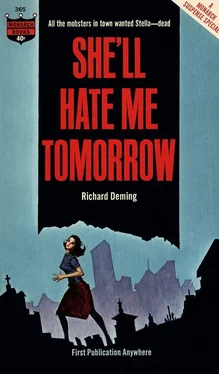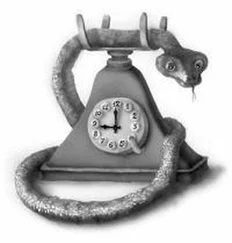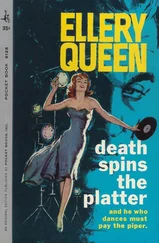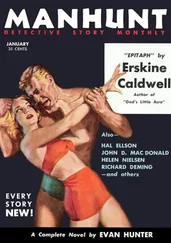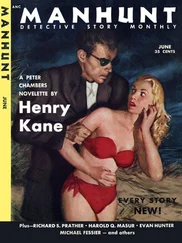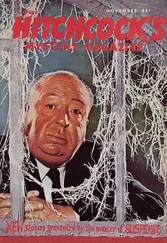Richard Deming
She’ll Hate Me Tomorrow
The attractive blond secretary looked up from her typewriter as the office door opened. A tall, thin man with an expressionless face glanced about the room, then nodded to someone out of sight to one side of the doorway. The thin man moved into the room, followed by a pale, powerfully built man with graying hair.
Beyond the flick of a glance he had given her when he first opened the door, the thin man paid the blonde no attention, moving directly to the door beyond her marked: PRIVATE. Opening this door, he glanced in and gave the pale man another nod.
The pale man threw the secretary a friendly smile as he passed, but he didn’t speak either. Both men entered the private office and the door closed behind them.
Stella Parsons had become used to the silent, unannounced visits of the pair during the six weeks she had worked as Carl Vegas’ private secretary. The attorney had a number of similarly secretive clients whom he never introduced to her, whom he always saw alone, and on whom no records whatever seemed to be kept. Most of these clients were mere faces to which she could attach no names, but she knew from recent news photos who the pale man was. He was Whitey Cord, Chicago’s top racketeer, currently in the news because the Federal Narcotics Bureau of Internal Revenue were simultaneously attempting to obtain indictments against him. The thin man who always accompanied him she assumed to be Cord’s bodyguard.
It had become increasingly apparent to Stella during the six weeks since she had entered the office fresh out of secretarial school that her employer was the prime legal adviser for the Chicago underworld. The knowledge upset her enough to make her consider resigning, but it was only a consideration. Her salary was far higher than she had ever expected to get on her first job, and the work was both pleasant and interesting. Rationalizing that racketeers were as entitled to legal advice as anyone else, she stayed on and attempted to ignore the comings and goings of the mysterious group of clients about whose business her employer never spoke.
Beyond the door of the private office a voice was suddenly raised in anger. There came the distinct sound of a palm slapping flesh, then the door was jerked open and the powerfully built Whitey Cord strode out without waiting for his bodyguard to check the outer room first. The thin man scurried after him and managed to reach the hall door ahead of his employer.
As the bodyguard checked the outer hall, Cord had a change of mind. Wheeling, he strode back to the still-open door of the private office.
“No shyster dumps me when the going gets hot,” he spat at the man inside. “Feds or no Feds, you get me out of this or you won’t be around to handle any clients.”
Carl Vegas’ voice, so thick Stella hardly recognized it, said from within the room, “Get out, you cheap punk. Make a pass at me and enough evidence will be in the D.A.’s hands in twenty-four hours to put you in the hot seat.”
The gray-haired racketeer’s eyes narrowed. “Evidence about what?”
“Otis Taylor, you stupid jerk. You can count on it that if anything happens to me, the D.A. will get a deposition in the mail the next day.”
Whitey Cord stared into the room for a moment more, then did an about-face and marched to the hall door being held open by his bodyguard. When he had passed through, the bodyguard pulled it closed from the outside.
The buzzer on Stella’s desk sounded.
Grabbing up her steno pad, Stella went to the door of the inner office and gave her employer an inquiring look. Carl Vegas was a plump, florid man in his late forties. At the moment his complexion was redder than ever, particularly on the left side of his face, which bore the scarlet imprint of a hand. His eyes were blazing and he spoke with the gutturalness of suppressed rage.
“Lock the outer door,” he said.
“Yes, sir,” Stella said obediently, turning and crossing the room to perform the chore.
When she returned to the inner office, the attorney growled, “Close the door and sit down.”
Pushing the door closed, Stella seated herself on a chair before the desk, crossed her trim legs and held a pencil poised over her notebook. Her employer studied her broodingly for a few moments, obviously letting his rage subside before speaking. Gradually his color returned to normal, except for the scarlet imprint of the hand on his left cheek.
Finally he said in his usual voice, “Remember our conversation the day I hired you, Stella?”
“Yes, sir. You mean about clients’ affairs being confidential, and I was never to discuss cases we handled with anyone?”
The lawyer nodded. “One of the reasons I picked you over other applicants was that you lived alone and had no relatives. The fewer close associates a secretary has, the better I like it. You told me you had no steady boy friend. Is that still the case?”
“Yes, sir,” she said, a trifle ruefully.
“Hmm. You’re young and good-looking enough to attract the boys. How does it happen you haven’t caught one?”
She colored slightly. “It’s hard for a lone girl to meet men in a big city unless she goes alone to bars. I won’t settle for that.”
He nodded approvingly. “You have a lot of time to find the right man. How old are you? About twenty-two?”
“Twenty-three.”
“Hmm. Coming here to school from that small town — Benton, wasn’t it? — you wouldn’t have any local contacts. I don’t suppose many young men attended your secretarial school?”
“None,” she said, even more ruefully.
“Well, one will come along eventually. Meantime there’s a certain advantage to me that you don’t have anyone close enough to confide in.”
At the time he hired her, Stella had been both surprised and gratified to be picked over several more experienced applicants. She had assumed that her excellent recommendation from the secretarial school was responsible, but now she realized the prime reason had been her relative social isolation.
Though she was a bit shy, Stella was attractive, friendly and intelligent enough to win popularity anywhere. The fact that she was virtually friendless wasn’t due to any personality defect. Since the age of sixteen she literally hadn’t had the time to form social contacts, and now that she had time, she didn’t quite know how to go about it.
Even after more than seven months in Chicago, she knew no one in her own age group aside from the girls she had met at secretarial school, and these — again because of the pressure of time — had never developed into more than classroom acquaintances.
Through a combination of circumstances she had no close associates anywhere else either. Orphaned at sixteen, she had been uprooted from her childhood friends in St. Louis and sent to live with an elderly uncle on a small farm in southern Illinois. Uncle Rufus, who didn’t believe in education for women, wanted her to quit school. Only by getting an after-school job in a dime store at nearby Benton so that she could pay for her keep was she able to talk him into letting her finish high school.
After high school Stella got a clerical job with the Farm Bureau and simultaneously her Uncle Rufus had the first of a series of strokes which kept him frequently bedridden, and periodically sent him to the hospital during the next four years. So again there was no time for social frivolities. As a practical nurse was financially out of the question, Stella drove straight back to the farm after work every day to care for her invalid uncle.
The farm had been mortgaged to the hilt to meet medical expenses, and when Uncle Rufus died, funeral costs took the rest of the little money that was left. When the estate was settled, Stella, as sole heir, received three hundred and fifty dollars.
Читать дальше
